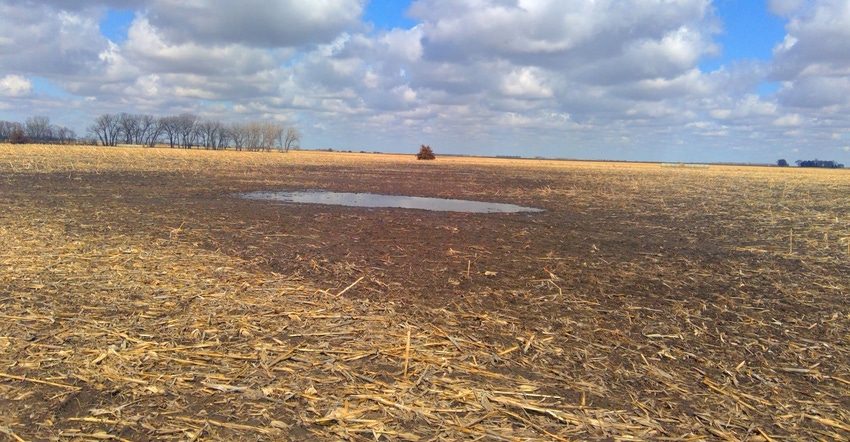
A third-generation farmer filed a lawsuit against the USDA, saying the agency is unlawfully preventing him from farming one of his fields. In 2011, the Natural Resources Conservation Service ruled that a seasonal mud puddle on Arlen Foster’s farm is protected by federal law as a wetland.
Foster requested that the government revisit its designation of his mud puddle as a protected wetland in 2020. Despite new evidence to the contrary, the NRCS refused to reconsider the determination. Now Foster is suing over the unconstitutional conditions he says the agency is attaching to his participation in crop insurance and other federal programs.
Foster and his wife, Cindy, are third-generation farmers in Miner County, South Dakota. Joined by their daughter and son-in-law and six grandchildren, the Fosters raise cattle, corn, soybeans and hay on the land Arlen’s grandfather bought back in 1900.
The family is proud of its responsible conservation practices on the farm, including no-till farming and preserving tree belts. Arlen’s father planted a tree belt on the south side of the farm in 1936 to prevent erosion. The tree belt is much taller today and collects deep snow drifts in the winter. As the weather warms, the melting snow collects in a low spot in the middle of a farm field before soaking into the ground or evaporating.
Tony Francois, a senior attorney at Pacific Legal Foundation representing Foster, explains the latest lawsuit challenges NRCS’s refusal to review the old certification as Foster has obtained new information on the snowpack and how it contributes to the puddle creation.
In 2011, Foster litigated the determination that the puddle is an artificial wetland, which does allow him to farm it if it’s dry enough. The 44-acre field has the approximately 0.88 acre puddle, which affects 1.5 to 2 acres surrounding the puddle from being planted in certain years. Francois explains Foster can plant in drier years if that area dries out similar to the surrounding area in the field.
The artificial wetland determination allows Foster to farm it if it’s not too muddy, but he’s not allowed to drain it. Foster would like to put in a shallow cut and allow the water to drain off into a ditch on wetter years. However, the cutting of a drainage ditch would make him ineligible under the swampbuster provisions in the 1985 Farm Bill that discourages the conversion of wetlands to cropland use.
Pacific Legal Foundation says even though the federal government has no authority to regulate the puddle on Foster’s land, the department is forcing Foster to choose between productively using his field or participating in federal programs for farmers, like crop insurance.
“The government lacks the authority to insist that he leave the mud puddle ‘muddy,’ so it’s threatening to take away Foster’s ability to participate in federal programs to achieve the outcome that it wants,” says Francois. “But Foster has a right to use his property and coercing him in this way violates his right.”
Pacific Legal argues the Commerce Clause of the Constitution limits what Congress can regulate, including water that doesn’t drain anywhere. And the Supreme Court has said government cannot force people to waive a constitutional right as a condition of getting federal benefits.
Francois says the end goal is to see NRCS held accountable to the statutory protections Congress has given farmers to have determinations reviewed. It also challengers Congress’ authority within legislation to leverage farm programs by micromanaging the way a farm operates.
He explains in the case of student loans, Congress cannot condition the award of a Pell grant on whether the student agrees he or she won’t criticize the government while in college. In the same way, Francois explains Congress lacks the constitutional power to regulate every puddle or muddy area on private property as a way of leveraging Foster into submitting to certain actions.
“One potential outcome in farm bill authorization is to take the lessons of this case influencing what kind of strings Congress can attach to farm bill programs,” says Francois.
The case is filed against USDA, NRCS and the Secretary of Agriculture Tom Vilsack in his position overseeing the department. Francois says the firm expects to hear in the next few weeks from the Department of Justice representing the federal agencies on whether it plans to file and answer or another motion related to the complaint.
GAO report on wetland determinations
The case comes at a time when a recent U.S. Government Accountability Office report found that USDA should do more to ensure compliance with wetland conservation provisions. USDA can withhold benefits from farmers who violate wetlands conservation rules.
GAO found that USDA checks about 1% of the applicable land a year, and identified fewer than 5 violations a year in the states with the most wetlands. The investigative arm also found that it waived penalties on 81% of cases where farmers said they acted in good faith.
Agency officials said NRCS has limited resources to conduct more checks. However, some USDA agencies emphasize risk-based criteria, rather than a random sample, in selecting tracts to check for compliance with other provisions. “Doing so makes the checks more efficient by targeting the tracts most likely to have violations,” GAO says. “If NRCS used a risk-based approach for its compliance checks (e.g., using information on acres cultivated annually on tracts), it could more efficiently ensure compliance with wetland conservation provisions.”
About the Author(s)
You May Also Like






